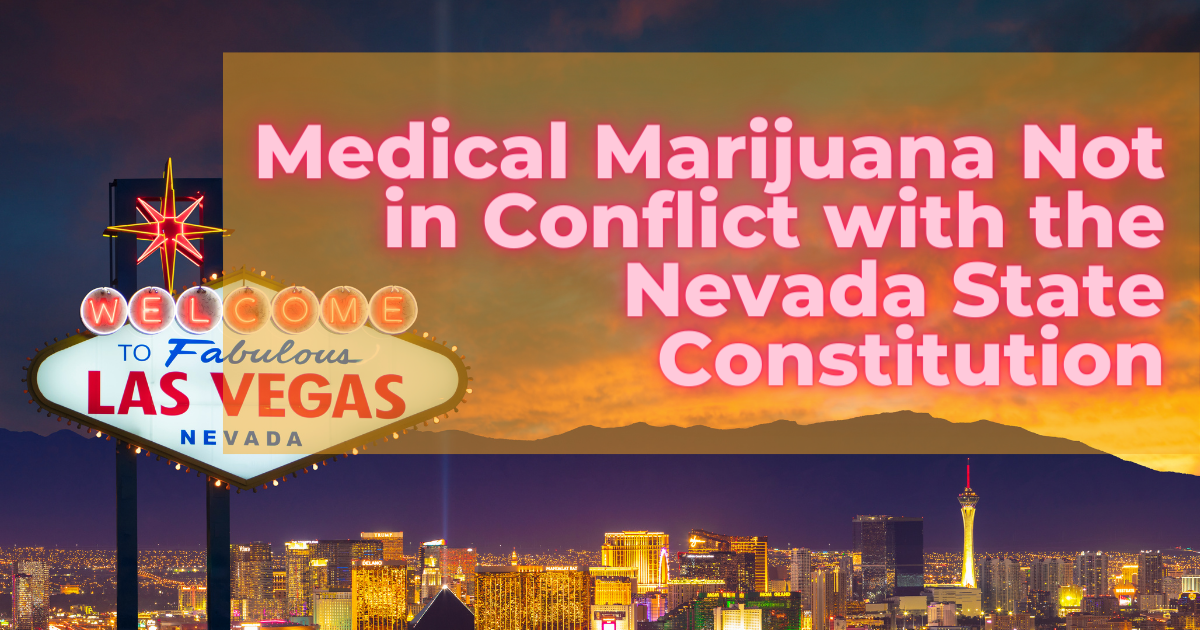Medical Marijuana Not in Conflict with the Nevada State Constitution
Clark County Judge Joe Hardy ruled that the Nevada Board of Pharmacy’s designation of marijuana as a Schedule I substance violates the state’s constitution. The ruling was a victory for the American Civil Liberties Union of Nevada (ACLUNV) which argued that the scheduling of marijuana in Nevada conflicts with the constitutional right to use marijuana for medical reasons. Nevada Revised Statute (NRS) 453.166 states that a Schedule I drug is one that’s believed to have a strong likelihood of abuse, doesn’t have a recognized use for treatment in the medical community, and thus lacks any benefit when administered under the care of a doctor.
The Schedule I classification doesn’t line up with the notion of medical marijuana being legal per the state constitution and is therefore not a valid definition when used to seek penalties for illicit marijuana use or trafficking. This means that any punishments and sentences handed out to criminals are effectively in conflict with a long-standing constitutional right to legally use marijuana for medical use.
Marijuana Moment, a cannabis-rights advocacy organization and news outlet for marijuana-related headlines, reported on the circumstances that surrounded the case:
“…despite voter-approved legalization, police have continued to make marijuana-related arrests because the Board of Pharmacy has refused to remove cannabis from its controlled substances list. That has effectively created a legal ‘loophole’ that the civil rights group says conflicts with long-standing constitutional protections for medical marijuana patients.”
In response to Hardy’s ruling, the ACLUNV stated that “[the state of Nevada has] argued the standard should be ‘accepted medical use in treatment’ in the U.S. and that the medical marijuana provision in the NV Constitution did not count.”
Judge Hardy, in opposition to the state’s argument in favor of retaining this Schedule I designation, said that “medical use or value is enshrined in our constitution. It’s clear to me that is correct.”
Nevada Drug Schedules
Nevada currently has five classifications for drug scheduling. They are as follows:
- Schedule I drugs have a high potential for abuse and no accepted medical use for treatment in the United States or lack accepted safety provisions for use in treatment even with medical supervision.
- Schedule II drugs also have a high potential for abuse. But the particular substance involved has an accepted medical use for treatment or an accepted medical use with severe restrictions and may lead to psychological or physical dependence.
- Schedule III substances are considered to have a lesser potential for abuse compared to the substances in Schedules I and II. The particular substance also must have a currently accepted medical use in treatment in the United States and abuse of the substance may lead to moderate or low physical dependence or high psychological dependence.
- Schedule IV drugs have a low potential for use compared to substances in Schedule III. They also must have a currently accepted medical use in treatment in the United States. Abuse of the substance may lead to limited physical dependence or psychological dependence relative to the substances in Schedule III.
- Schedule V drugs have a low potential for abuse relative to substances listed in Schedule IV. They also have an accepted medical use in the United States, and under the statute, abuse of the substance may lead to limited physical dependence or psychological dependence relative to the substances listed in Schedule IV.
How Drugs Came to Be Scheduled in the U.S.
Drugs are traditionally scheduled at the federal level through additions to the Controlled Substances Act (CSA), which was enacted by Congress in May of 1971. Prior to the existence of the CSA, the US federal government didn’t have centralized authority over drug policy, meaning they pursued the regulation of troublesome substances individually through targeted legislation. Once the CSA went into effect, states then followed suit with enacting their own copies of the legislation in the years since that gave them the authority to schedule drugs at the state level ahead of the federal government.
Learn More
To learn more about how Landmark Recovery of Las Vegas treats its patients or how we can help you achieve lasting recovery, give our dedicated admissions team a call at 888-448-0302. Our Las Vegas treatment center provides safe and effective addiction treatment to all those in Las Vegas and surrounding states. Our mission is to save a million lives by the end of the century, starting with those in our Vegas backyard.

Choose Recovery Over Addiction
We're here 24/7 to help you get the care you need to live life on your terms, without drugs or alcohol. Talk to our recovery specialists today and learn about our integrated treatment programs.




